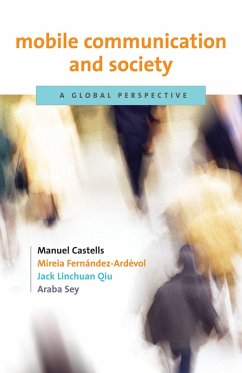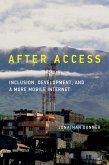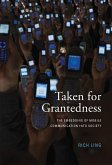How wireless technology is redefining the relationship of communication, technology, and society around the world—in everyday work and life, in youth culture, in politics, and in the developing world.
Wireless networks are the fastest growing communications technology in history. Are mobile phones expressions of identity, fashionable gadgets, tools for life—or all of the above? Mobile Communication and Society looks at how the possibility of multimodal communication from anywhere to anywhere at any time affects everyday life at home, at work, and at school, and raises broader concerns about politics and culture both global and local.
Drawing on data gathered from around the world, the authors explore who has access to wireless technology, and why, and analyze the patterns of social differentiation seen in unequal access.They explore the social effects of wireless communication—what it means for family life, for example, when everyone is constantly in touch, or for the idea of an office when workers can work anywhere. Is the technological ability to multitask further compressing time in our already hurried existence?
The authors consider the rise of a mobile youth culture based on peer-to-peer networks, with its own language of texting, and its own values. They examine the phenomenon of flash mobs, and the possible political implications. And they look at the relationship between communication and development and the possibility that developing countries could "leapfrog" directly to wireless and satellite technology. This sweeping book—moving easily in its analysis from the United States to China, from Europe to Latin America and Africa—answers the key questions about our transformation into a mobile network society.
Wireless networks are the fastest growing communications technology in history. Are mobile phones expressions of identity, fashionable gadgets, tools for life—or all of the above? Mobile Communication and Society looks at how the possibility of multimodal communication from anywhere to anywhere at any time affects everyday life at home, at work, and at school, and raises broader concerns about politics and culture both global and local.
Drawing on data gathered from around the world, the authors explore who has access to wireless technology, and why, and analyze the patterns of social differentiation seen in unequal access.They explore the social effects of wireless communication—what it means for family life, for example, when everyone is constantly in touch, or for the idea of an office when workers can work anywhere. Is the technological ability to multitask further compressing time in our already hurried existence?
The authors consider the rise of a mobile youth culture based on peer-to-peer networks, with its own language of texting, and its own values. They examine the phenomenon of flash mobs, and the possible political implications. And they look at the relationship between communication and development and the possibility that developing countries could "leapfrog" directly to wireless and satellite technology. This sweeping book—moving easily in its analysis from the United States to China, from Europe to Latin America and Africa—answers the key questions about our transformation into a mobile network society.
Dieser Download kann aus rechtlichen Gründen nur mit Rechnungsadresse in A, B, BG, CY, CZ, D, DK, EW, E, FIN, F, GR, HR, H, IRL, I, LT, L, LR, M, NL, PL, P, R, S, SLO, SK ausgeliefert werden.









